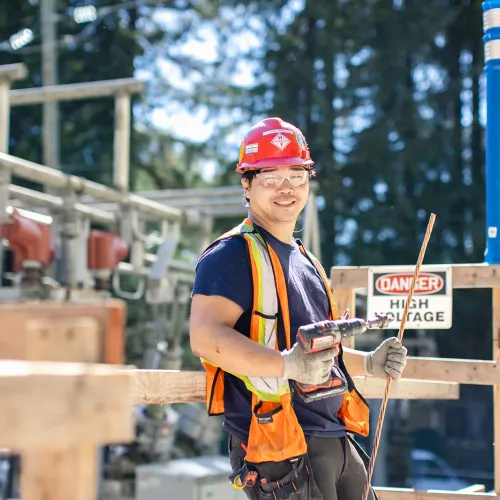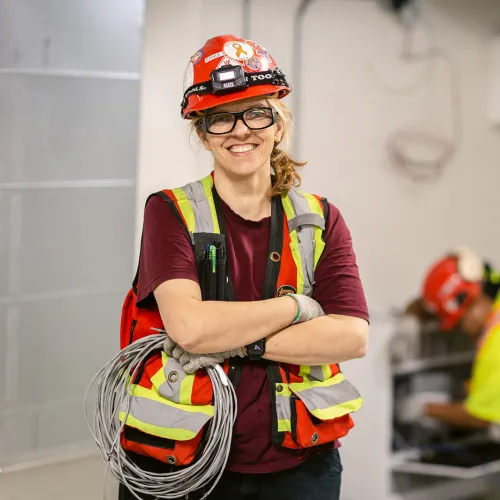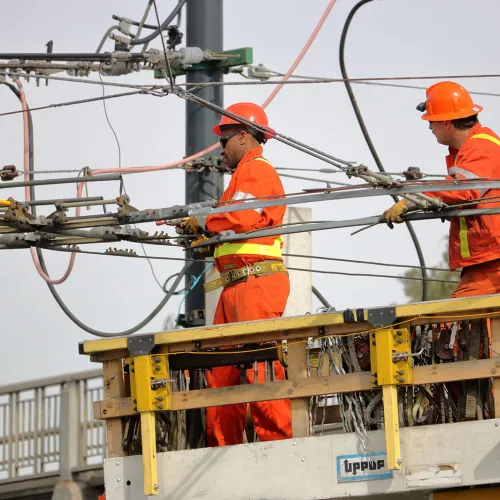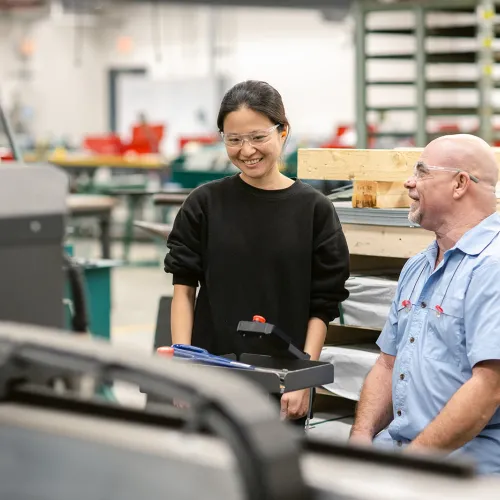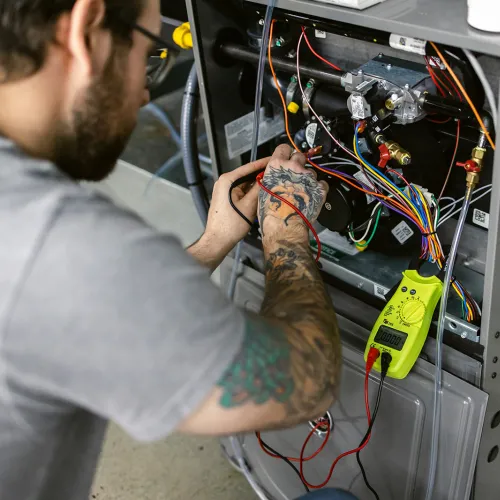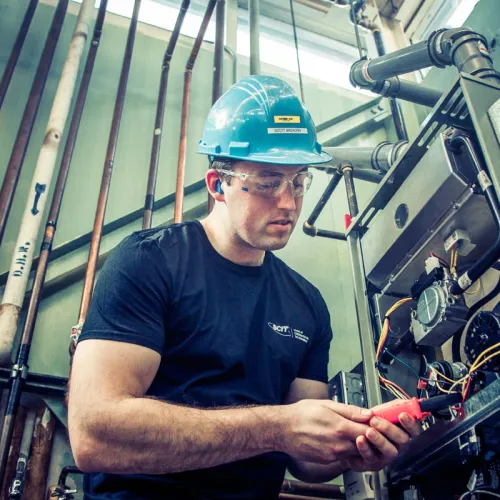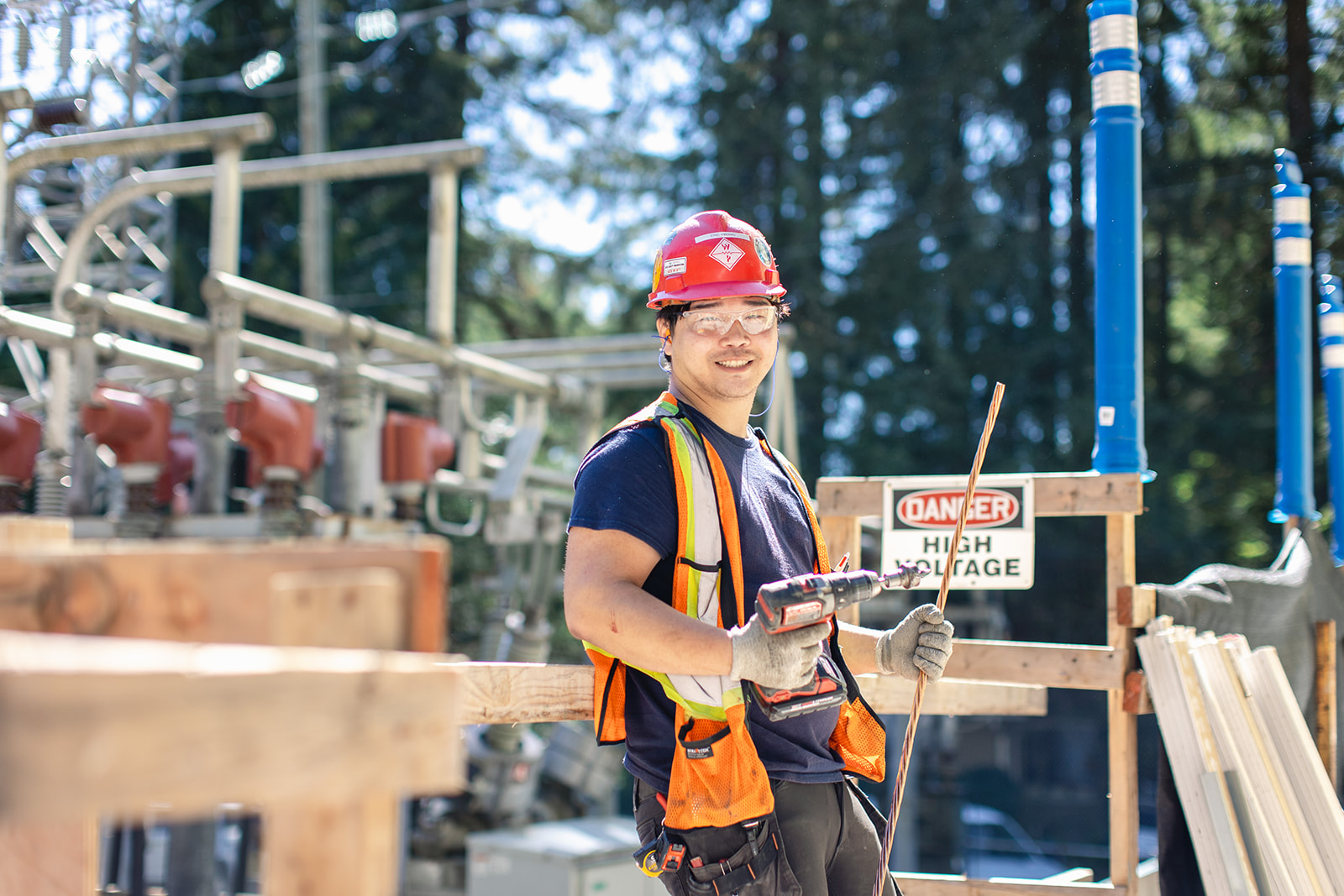
Why Skilled Trades Certification?
With more than 83,000 job openings expected in the next decade, there has never been a better time to join the skilled trades. While British Columbia has a strong and effective trades training system that offers multiple pathways for individuals to achieve certification, it has not had compulsory trades for two decades. Skilled Trades Certification looks to standardize the training apprentices receive and works to level the playing field, helping to attract a diverse workforce.
Are you
impacted?
Skilled Trades Certification Trades
These trades were chosen because they are in high demand, contain relatively low numbers of uncertified workers, and are regulated by other regulators for safety and workmanship. This allows for the least disruption to workers and employers as we transition to a Skilled Trades Certification system over the coming years.
As part of SkilledTradesBC’s broadened responsibility for trades training and set out in the Skilled Trades BC Act, Skilled Trades Certification has been implemented for the following trades:
Employers, Experienced Workers, Level Challengers
Employers, Experienced Workers, Level Challengers

If you have between 1-4 years of experience in your trade, you can become a Level Challenger, putting you on the fast track to become a certified journeyperson.

If you have over 5 years of work experience in your trade, you can apply to either become a Trade Qualifier or an Uncertified Experienced Worker.
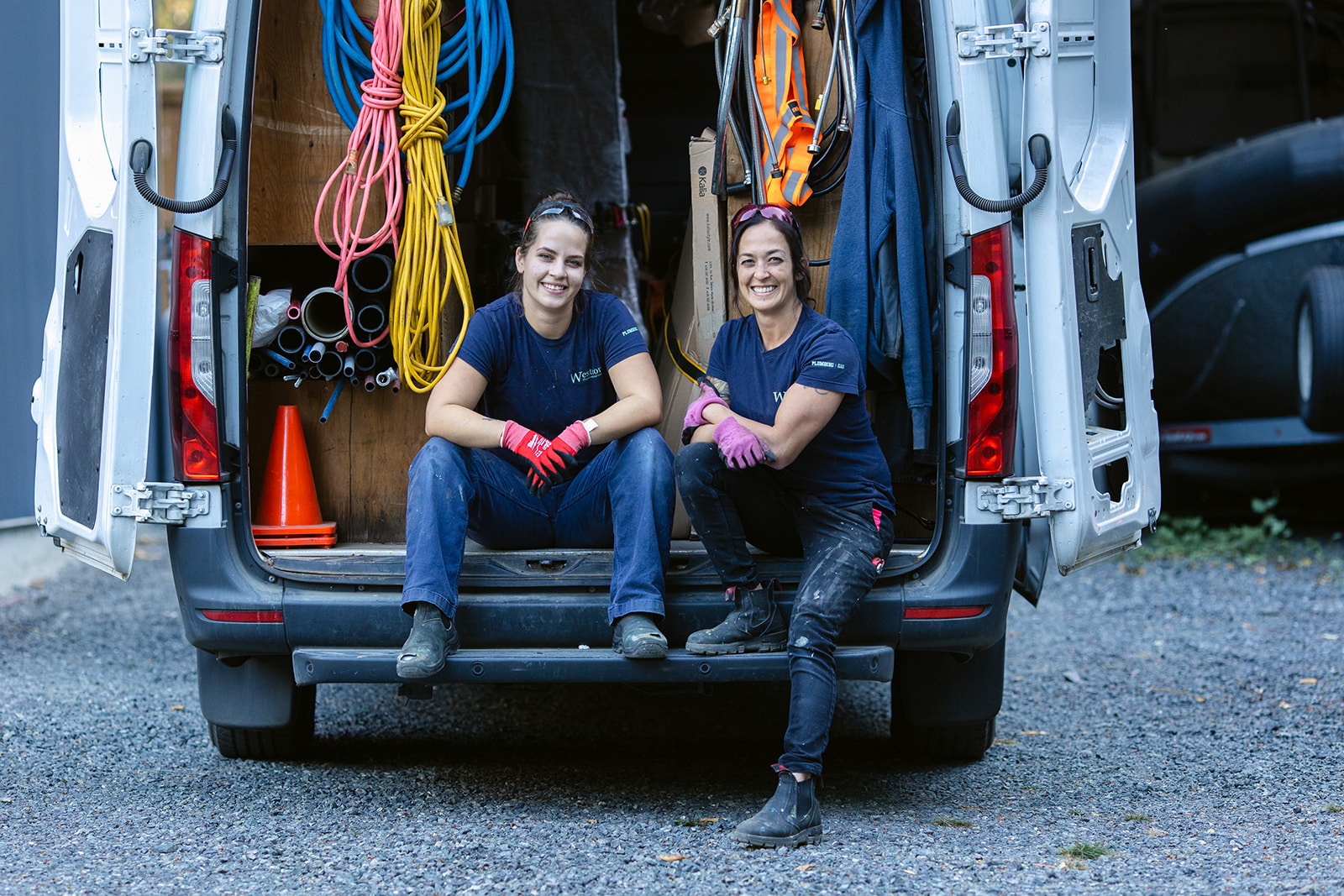
Learn how Skilled Trades Certification can be good for your business and what your responsibilities are as an employer.
Contact an
advisor
Our team is here to support and provide guidance. Reach out to a Certification Advisor directly.
Additional Resources
Additional Resources
New Supports
In addition to the provincial and federal supports available to registered employers and apprentices, we have enhanced our Skilled Trades Certification supports.
Information Sessions & Events
Join one of our information sessions to speak with our team.
Resources
Downloadable resources including our brochures and webinar recordings.
Interprovincial Exam Refreshers
To help Apprentices and Trade Qualifiers pass their Interprovincial (IP) Red Seal exams, SkilledTradesBC is subsidizing tuition for participants who take exam refresher courses.
Frequently Asked Questions
There will be no impact to registered apprentices and certified journeypeople.
However, unregistered workers who are currently in one of the Skilled Trades Certification trades will have to be either registered as an apprentice with an employer sponsor, a certified journeyperson, or have applied to become a Trade Quailifer or Uncertified Experienced Worker.
Click here to find out what actions you need to take.
You will need to ensure that your workers are either a registered apprentice, a certified journeyperson or registered as a Trade Qualifier or Uncertified Experienced Worker with SkilledTradesBC. You are also responsible for ensuring adequate on-the-job learning and supervision by maintaining a maximum ratio of 2:1 apprentices to journeyperson. We’ve added a new Employer Workforce Submission on our Portal to help with recording all of this information.
More information on Skilled Trades Certification, the pathways to certification and your role as an Employer can be found on this page.
Our Advisors are here to help understand your unique situation and support you on the pathway to meeting the requirements. Contact us by filling out this form and we’ll get back to you as soon as possible.
If an apprentice wants to attain certification in a skilled trade, they are required to register with a sponsor to receive on-the-job training done by certified journeypersons. A supervision ratio is a limit on the number of apprentices a journeyperson can train at a time.
For electrical and mechanical Skilled Trades Certification trades, the supervision ratio of apprentice to journeyperson is 2:1 (two to one).
A 2:1 apprentice to journeyperson supervision ratio helps ensure that apprentices are able to get the right level of training and experience they need to become qualified workers, who in turn are able to support businesses and the needs of British Columbians.
Learn more about supervision ratios on our employer page. If you have any further questions about meeting the supervision ratio or how it might affect you, please sign in to the Portal to complete the Employer Workforce Submission and a Skilled Trades Certification Advisor will reach out to support.
SkilledTradesBC has introduced a new Employer Workforce Submission on our customer portal for all employers of workers in Skilled Trades Certification trades to provide information about their workforce.
The information gathered will be used to identify workers and employers in Skilled Trades Certification trades, help us understand more about their existing workforce and provide assistance to those who may need our support in meeting the new requirements.
For example, if an employer employs unregistered workers, our Skilled Trades Certification Advisor team will reach out to help get these workers registered and on the path to certification.
Up-to-date information on Skilled Trades Certification trades in our province will also help us advance and enhance B.C.’s valuable certification system.
Employers will be asked to provide the following information:
- Apprentices’ full names, SkilledTradesBC IDs, Trade
- Journeypersons’ full names, email addresses, Certificate Number, province they were certified in, Trade (remember to include yourself, if appropriate)
- Trade Qualifiers and Uncertified Experienced Workers’ Full names, SkilledTradesBC IDs, Temporary Authorization numbers, Trade
- If you are not the sponsor of your employees, please have the sponsor name, email address and phone number ready
Scope of work refers to general activities, tasks or functions carried out by workers in their respective trade. It is linked and driven by the definition in each trade profile established for our apprenticeship programs, which is consistent with the National Red Seal Occupational Standard definition.
Details of the scope of work of Skilled Trades Certification trades can be found here.
A Temporary Authorization issued by SkilledTradesBC authorizes an uncertified worker to continue to work in a Skilled Trades Certification trade for a certain period of time.
Once you submit an application as a Trade Qualifier or Uncertified Experienced Worker and receive approval, you will automatically be issued a Temporary Authorization.
Our goal is to support employers and individuals in meeting these new requirements. Signing up for the SkilledTradesBC Portal and starting your application to become a Trade Qualifier or Uncertified Experienced Worker.
For more information on Temporary Authorizations, visit this page.
Skilled Trades Certification is now in effect for electrical and mechanical trades. Workers in these trades need to be registered as an apprentice or a certified journeyperson and employers need to ensure adequate on-the-job learning and supervision by maintaining the 2:1 apprentice to journeyperson ratio. Three additional automotive trades will be introduced in 2024, when phase two begins, and will have one year to transition.
We recognize that workers and employers have many unique circumstances and our goal is to support you to become certified and meet the requirements, if you haven’t yet. Please complete this contact form to get in touch with an Advisor. We’re here to help!
If you are an uncertified worker or employer in one of the Skilled Trades Certification trades and unable to or not sure if you meet the requirements, our team of Advisors is here to guide you. Our goal is to understand your unique situation and find solutions together that will allow help you meet the requirements. Please complete this contact form and our team will provide assistance to your need.
We understand that everyone has a unique situation, and our team is here to support you on how to meet these new requirements.
The first step is to log in or sign up for our customer portal, where you can create your organizational profile and provide information about your workforce. The information you share will allow us to provide you with more tailored support, including helping you ensure any unregistered workers get on the pathway to certification.
As an interim measure, SkilledTradesBC will recognize holders of Gasfitter Class A and Class B Certificate of Qualification issued by Technical Safety BC as being compliant with Skilled Trades Certification beginning December 1, 2023, and there is no further action required at this time.
We also continue to recognize Gasfitter Class A and Class B Certificate of Qualification or Apprenticeship issued by SkilledTradesBC or another Canadian jurisdiction, as well as Interprovincial Red Seal Certification in Gasfitter Class A and Class B.
If you have any questions about the Skilled Trades Certification requirements, please complete this Contact form and our Advisors will get in touch with you to assist you further.
SkilledTradesBC and Technical Safety BC are working together to see how we can streamline the process between the two organizations, helping impacted employers and trades workers on their journey to certification, with a focus on the experienced worker.
We will update all those impacted with any future changes, with ample time and support needed if there are additional measures that need to be taken in the future. Complete this contact form here to receive the latest updates when it becomes available.
If you already have a Certificate of Qualification issued by jurisdictional authorities in other Canadian provinces or territories or an Interprovincial Red Seal in Skilled Trades Certification trades, you have met the requirements of Skilled Trades Certification.
No, there is no impact to participants in training programs recognized by SkilledTradesBC that has a work experience component. This includes foundation program or Indigenous community-based programs with co-op or on the job placements, youth trades programs and trades related diplomas and certification programs. They may continue to work as they are exempt from the requirements.
They are also not counted as part of the supervision ratio for employers.

